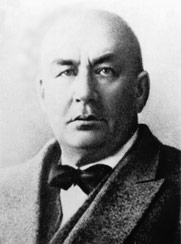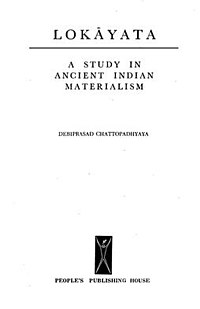
Krishnachandra Bhattacharyya, commonly referred to as K.C. Bhattacharyya,, was a modern Indian philosopher affiliated with the University of Calcutta. He gained renown for his method of "constructive interpretation," a scholarly approach employed to elucidate and elaborate upon the interrelationships and intricacies inherent in ancient Indian philosophical systems. This method facilitated an examination of these systems akin to the scrutiny applied to contemporary philosophical problems. Bhattacharyya dedicated particular attention to the inquiry into the manner in which the mind engenders what appears to be a material universe. Notably, Bhattacharyya advocated for an immersive cosmopolitanism, wherein Indian philosophical frameworks were contemporized through a process of assimilation and immersion, eschewing a mere replication of European ideas in favour of a more nuanced integration.
Charvaka, also known as Lokāyata, is an ancient school of Indian materialism. It is considered as one example of the atheistic schools in the Ancient Indian philosophies. Charvaka holds direct perception, empiricism, and conditional inference as proper sources of knowledge, embraces philosophical skepticism and rejects ritualism. It was a well-attested belief system in ancient India.

Adi Shankara, also called Adi Shankaracharya, was an Indian Vedic scholar and teacher (acharya) of Advaita Vedanta. Reliable information on Shankara's actual life is scanty, and his true impact lies in his "iconic representation of Hindu religion and culture," despite the fact that most Hindus do not adhere to Advaita Vedanta. He is seen as "the one who restored the Hindu dharma against the attacks of the Buddhists and in the process helped to drive Buddhism out of India." Tradition also portrays him as the one who reconciled the various sects with the introduction of the Pañcāyatana form of worship, the simultaneous worship of five deities – Ganesha, Surya, Vishnu, Shiva and Devi, arguing that all deities were but different forms of the one Brahman, the invisible Supreme Being.
Hindu philosophy or Vedic philosophy is the set of Indian philosophical systems that developed in tandem with the religion of Hinduism during the iron and classical ages of India. In Indian tradition, the word used for philosophy is Darshana, from the Sanskrit root 'दृश' meaning 'to see, to experience'.
Mīmāṁsā is a Sanskrit word that means "reflection" or "critical investigation" and thus refers to a tradition of contemplation which reflected on the meanings of certain Vedic texts. This tradition is also known as Pūrva-Mīmāṁsā because of its focus on the earlier (pūrva) Vedic texts dealing with ritual actions, and similarly as Karma-Mīmāṁsā due to its focus on ritual action (karma). It is one of six Vedic "affirming" (āstika) schools of Hindu philosophy. This particular school is known for its philosophical theories on the nature of Dharma, based on hermeneutics of the Vedas, especially the Brāḥmanas and samhitas. The Mīmāṃsā school was foundational and influential for the Vedāntic schools, which were also known as Uttara-Mīmāṁsā for their focus on the "later" (uttara) portions of the Vedas, the Upanishads. While both "earlier" and "later" Mīmāṃsā investigate the aim of human action, they do so with different attitudes towards the necessity of ritual praxis.

Indian philosophy consists of philosophical traditions of the Indian subcontinent. The philosophies are often called darśana meaning, "to see" or "looking at." Ānvīkṣikī means “critical inquiry” or “investigation." Unlike darśana, ānvīkṣikī was used to refer to Indian philosophies by classical Indian philosophers, such as Chanakya in the Arthaśāstra.
The Buddhist doctrine of the two truths differentiates between two levels of satya in the teaching of the Śākyamuni Buddha: the "conventional" or "provisional" (saṁvṛti) truth, and the "ultimate" (paramārtha) truth.

Debiprasad Chattopadhyaya was an Indian Marxist philosopher. He made contributions to the exploration of the materialist current in ancient Indian philosophy. He is known for Lokayata: A Study in Ancient Indian Materialism, which is his exposition of the philosophy of Lokayata. He is also known for work on history of science and scientific method in ancient India, especially his 1977 book Science and Society in Ancient India on the ancient physicians Charaka and Sushruta. He was awarded the Padma Bhushan, India's third highest civilian honour, posthumously, in 1998.

Fyodor Ippolitovich Shcherbatskoy or Stcherbatsky, often referred to in the literature as F. Th. Stcherbatsky, was a Russian Indologist who, in large part, was responsible for laying the foundations in the Western world for the scholarly study of Buddhism and Buddhist philosophy. He was born in Kielce, Poland, and died at the Borovoye Resort in northern Kazakhstan.
Purushartha literally means "object(ive) of men". It is a key concept in Hinduism, and refers to the four proper goals or aims of a human life. The four puruṣārthas are Dharma, Artha, Kama and Moksha.
Ajita Kesakambali was an ancient Indian philosopher in the 6th century BC. He is considered to be the first known proponent of Indian materialism, and forerunner to the Charvaka school. He was probably a contemporary of the Buddha and Mahavira. It has frequently been noted that the doctrines of the Lokayata school were considerably drawn from Ajita's teachings.

Ram Sharan Sharma was an Indian historian and Indologist who specialised in the history of Ancient and early Medieval India. He taught at Patna University and Delhi University (1973–85) and was visiting faculty at University of Toronto (1965–1966). He also was a senior fellow at the School of Oriental and African Studies, University of London. He was a University Grants Commission National Fellow (1958–81) and the president of Indian History Congress in 1975. It was during his tenure as the dean of Delhi University's History Department that major expansion of the department took place in the 1970s. The creation of most of the positions in the department were the results of his efforts. He was the founding Chairman of the Indian Council of Historical Research (ICHR) and a historian of international repute.

Professor Debi Prasad Chattopadhyaya, was educated at the University of Calcutta and was Deputy Minister of Health of India and Union Minister of Commerce and Industry. He founded the Indian Council of Philosophical Research, New Delhi, and served as its Chairman. Till the end of his life, he served as the Chairman of the Centre for Studies in Civilizations, and General Editor of the Project of History of Indian Science, Philosophy and Culture, which produced a multi-volume cultural history of India.
Jayarāśi Bhaṭṭa was an Indian philosopher known for his radical skepticism who most likely flourished between 800-840 probably in southern India. He was the author of one of the most extraordinary philosophical works in Indian history, the Tattvopaplavasiṃha in which he professed radical skepticism, which posits the impossibility of knowledge. In his work, he attempts to show the contradictions of various philosophical positions as well as the counter positions. He is loosely affiliated to the materialist Cārvāka/Lokāyata school of philosophy but his affiliation with charvaka is disputed among scholars. He has been differently classified as a sceptic, agnostic or materialist atheist.
Prabhakara active c. 6th century was an Indian philosopher-grammarian in the Mīmāṃsā tradition of Kerala.
Uddalaka Aruni, also referred to as Uddalaka or Aruni or Uddalaka Varuni, is a revered Vedic sage of Hinduism. He is mentioned in many Vedic era Sanskrit texts, and his philosophical teachings are among the center piece in the Brihadaranyaka Upanishad and Chandogya Upanishad, two of the oldest Upanishadic scriptures. A famed Vedic teacher, Aruni lived a few centuries before the Buddha, and attracted students from far regions of the Indian subcontinent; some of his students such as Yajnavalkya are also highly revered in the Hindu traditions. Both Aruni and Yajnavalkya are among the most frequently mentioned Upanishadic teachers in Hinduism.

In Hinduism, Brahman connotes the highest universal principle, the Ultimate Reality of the universe. In major schools of Hindu philosophy, it is the non-physical, efficient, formal and final cause of all that exists. It is the pervasive, infinite, eternal truth, consciousness and bliss which does not change, yet is the cause of all changes. Brahman as a metaphysical concept refers to the single binding unity behind diversity in all that exists.
Parā Vidyā is a combination of two words – parā, in Hindu philosophy, means - existence, paramount object, the highest point or degree, final beatitude; and vidyā means - knowledge, philosophy, science, learning, scholarship. Para Vidya means – higher learning or learning related to the Self or the Ultimate Truth i.e. transcendental knowledge. Vedanta affirms that those who gain the knowledge of the Self attain kaivalya, they become liberated, they become Brahman.

Ramkrishna Bhattacharya was an academic author and exponent of an ancient school of Indian materialism called Carvaka/Lokayata.

Marietta Stepanyants is a Russian philosopher, the founder and the Chairholder of the UNESCO Chair in “Philosophy in the Dialogue of Cultures” and the Chief Research Fellow at the Institute of Philosophy, Russian Academy of Sciences. She is an Honored Scholar of the Russian Federation and an active member of the Academy of Humanities since 1995.










